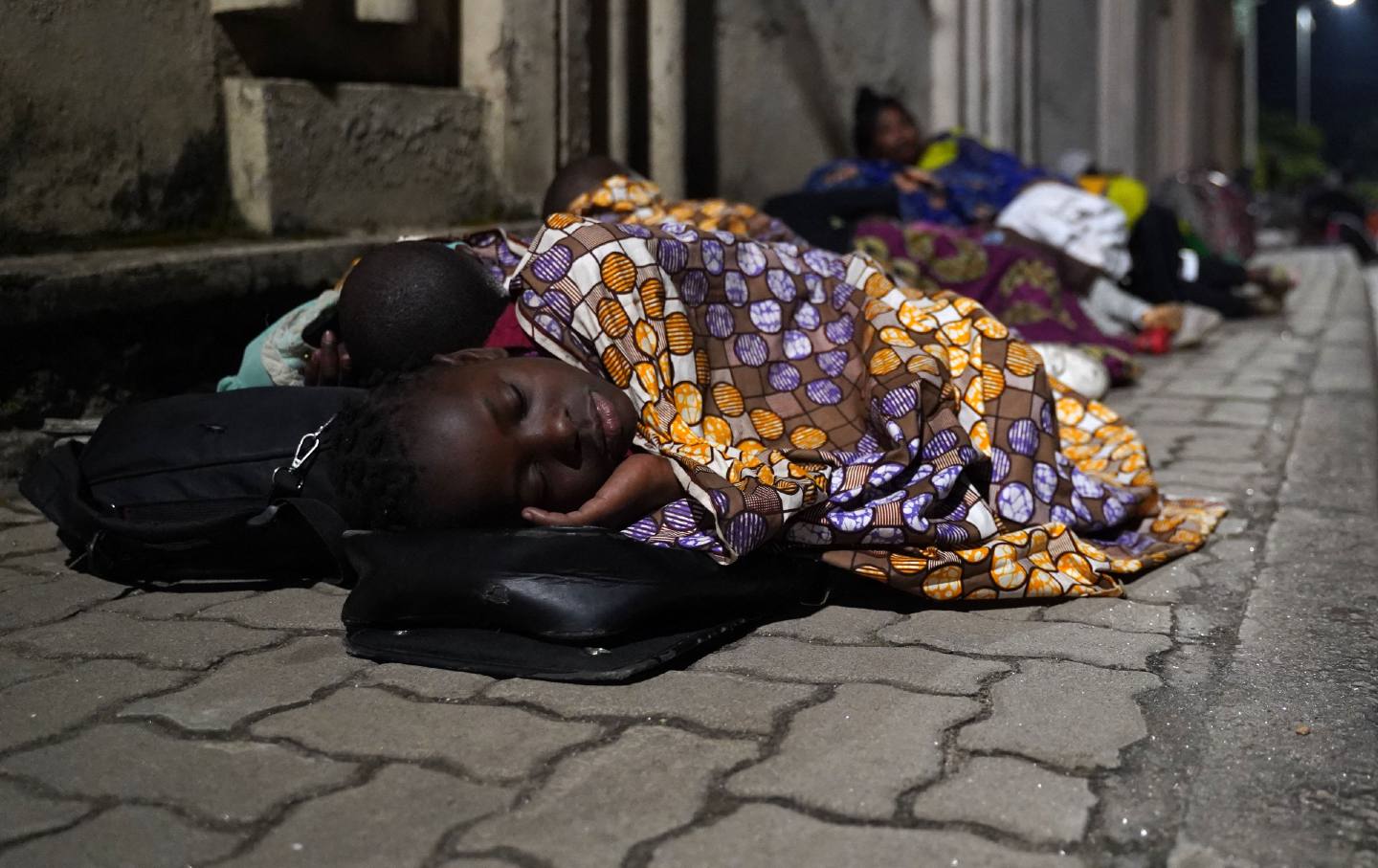
People fleeing from Goma, Democratic Republic of Congo, sleep with their belongings on a street after a volcano erupted near the border in Rwanda in May 2021. (Simon Wohlfahrt / Getty Images)
On May 22, the Nyiragongo volcano erupted in eastern Democratic Republic of Congo, sending half a million Congolese people fleeing to safety. Many of the refugees carried their mattresses on their backs, often for more than 10 miles. Why?
Kambale Musavuli is a spokesperson for the US-based solidarity group Friends of the Congo. He has been in contact with his family members who fled Goma, the city at the base of the volcano. He explained: “People know what to do if they have to become refugees. My parents and grandparents had to run from violence in past decades. There were already 5.5 million displaced people in Congo even before the volcano erupted.”
He continued: “My relatives don’t know when they will be able to return. They know there will be nowhere to stay wherever they end up. So they bring their mattresses so they will have some place to sleep.”
The rich world has exploited the mineral wealth of the Democratic Republic of the Congo for more than a century, but once again, when another crisis hits, there is silence and inaction. This chronic indifference has contributed to what may be the worst ongoing humanitarian crisis anywhere since the end of World War II. The International Rescue Committee has estimated that since 1998 at least 5.4 million Congolese people have died, from violence, hunger, and disease.
So far, the Western media has covered the volcano crisis inadequately—and there is absolutely no sense of urgency in government offices in Washington, Brussels, or London. If a tragedy on the same scale were happening anywhere in America, Europe, or Japan, planeloads of journalists would be en route. Jan Egeland, the former humanitarian UN official who heads Norway’s relief effort, is in Goma, and he describes the crisis as “the largest neglected emergency on earth.”
Egeland warned that the global humanitarian aid appeal for DR Congo was only 12 percent funded by mid-May. Even before the volcano erupted, another aid agency, CARE, said that nearly 7 million Congolese were “one step from famine.”
DR Congo and its 87 million people may seem remote from readers in the West. But powerful Western businesses are to blame for much of their misery, including mining multinationals like Glencore and Ivanhoe, and a billionaire Israeli “businessman” named Dan Gertler. Gertler’s case is particularly shocking. He was allegedly so corrupt that even the Trump Treasury Department sanctioned him in 2017, hampering him from doing business globally. (Trump, lobbied by attorney Alan Dershowitz, reversed the sanctions during his last week in office, but, fortunately, the Biden administration reimposed them in March.)
There’s no way to know for sure, but a well-placed source estimates Gertler is worth somewhere between $1 and $2 billion. This is a lot of money anywhere, but the DR Congo’s total government budget for 2021 is only $6.9 billion; the economic crisis forced a 23 percent reduction from 2020. Here’s what the US Treasury Department said when it sanctioned Gertler. He “is an international businessman and billionaire who amassed his fortune through hundreds of millions of dollars’ worth of opaque and corrupt mining deals in the Democratic Republic of the Congo…. [As a result of his actions,] between 2010 and 2012 alone, the DRC reportedly lost over $1.36 billion in revenues from the underpricing of mining assets that were sold to offshore companies linked to Gertler.”
The DRC desperately needs money to fight hunger, improve the skeletal health system, and just maybe start to construct a professional army to replace the roving bands of unpaid brigands who steal and rape, especially in the east. If there is anywhere on the planet where the rich world has a long-standing historic responsibility to help, DR Congo is such a place.
What’s more, there are special ties between the DR Congo and African Americans. By one estimate, 25 percent of the Africans who were kidnapped and brought to America originated in the country’s west, from the area then known as the Kongo Kingdom. Professor Robert Farris Thompson’s Flash of the Spirit (1983) has detailed at length the Kongo’s influence in Afro-American music, art and religion. Congo Square in New Orleans was the only place enslaved African Americans were allowed to meet together, on Sundays.
Friends of the Congo is raising funds for Yole!Africa, a well-known grass-roots community group based in Goma that is providing food, water, and a place to stay for the volcano refugees outside the immediate danger zone. Petna Ndaliko founded the group in 2002 to promote the arts, critical thinking, and community welfare; Yole! means “Come Together.” Ndaliko said the DRC government and international aid agencies have been slow to react, so the group is trying to step up its own relief efforts. “Among those we are helping are farmers whose fields were buried under lava flows,” he said.
Recently, knowledge about the DR Congo’s history has, thankfully, improved. Adam Hochschild’s book King Leopold’s Ghost (1998, now regarded as a classic), describes in sickening and thorough detail how the Belgian king, with the complicity of Europe and the United States, murdered earlier generations of Congolese in the greedy search for ivory and rubber. Hochschild estimates that some 10 million people died between 1885 and 1908. Tragically, the ongoing acute crisis means that the DR Congo’s exploitation and suffering did not end with King Leopold.
James NorthTwitterJames North has reported from Africa, Latin America, and Asia for 50 years. He lives in New York City.